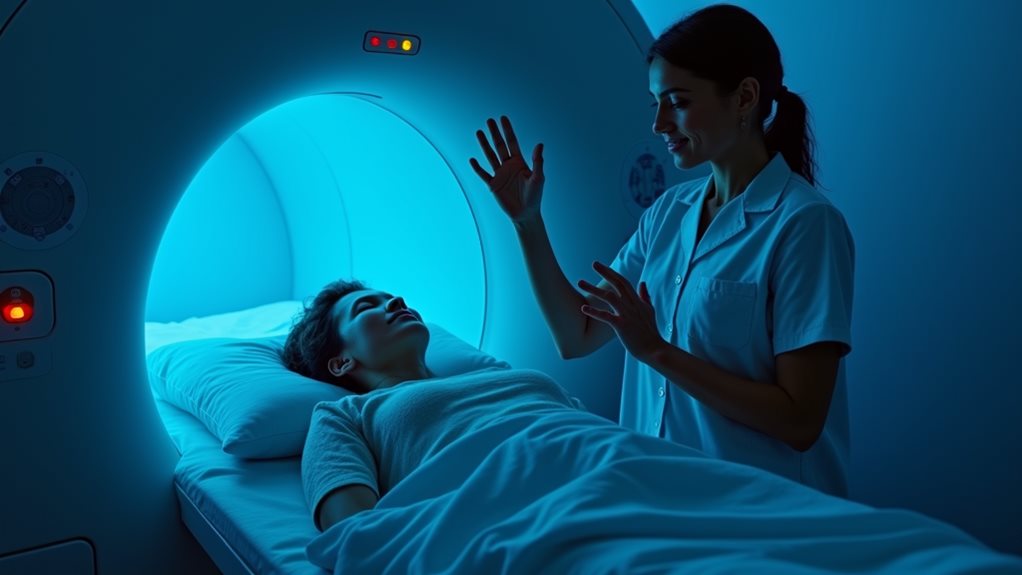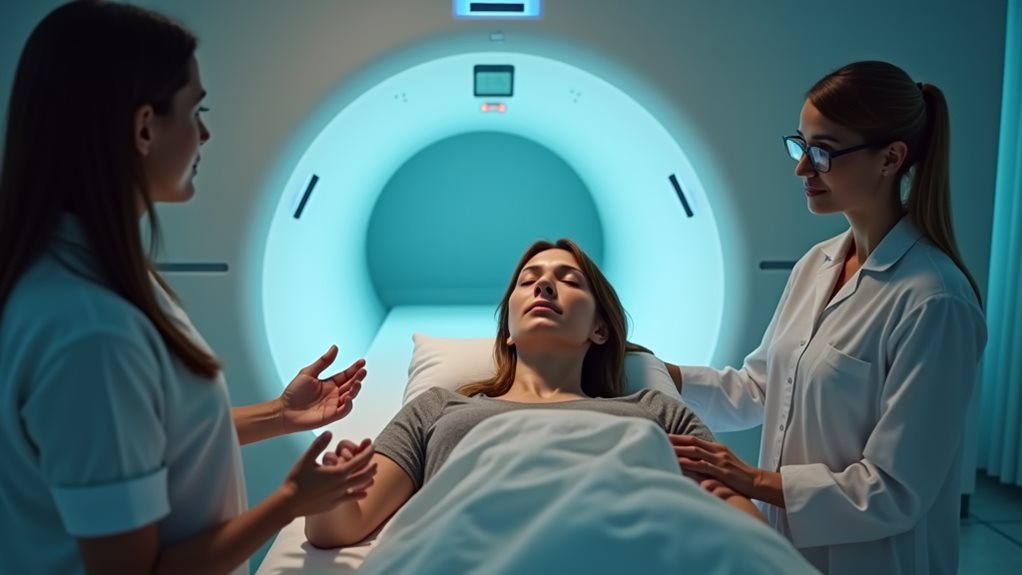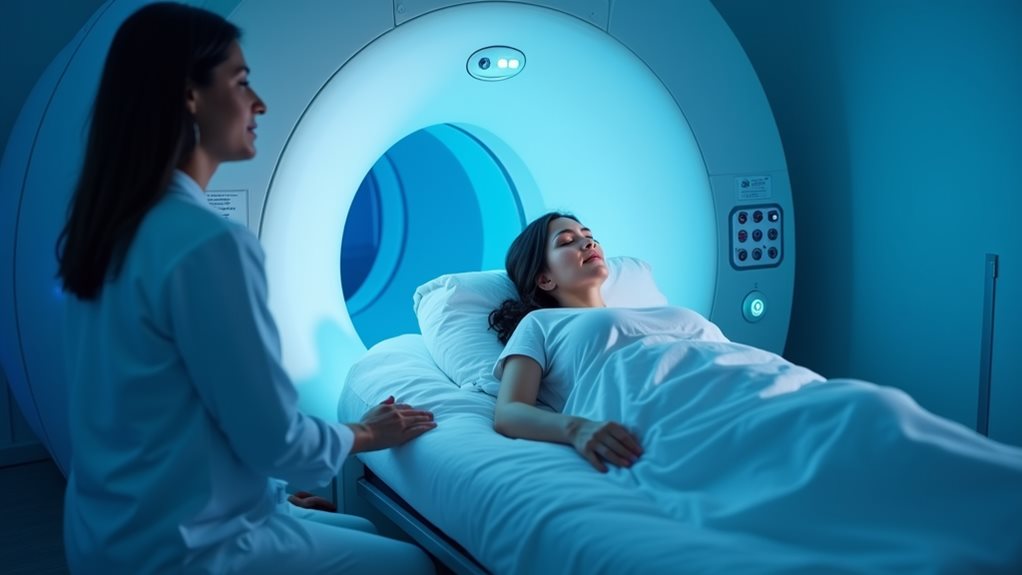
Hypnosis and Emotional Freedom Technique (EFT) are proven interventions that effectively alleviate MRI anxiety. By using hypnosis, individuals can enter a state of deep relaxation, allowing them to take control of their fears. EFT's tapping technique further helps in regulating emotions and calming the nervous system during scans. These methods empower patients to manage their anxiety, creating a more composed MRI experience. Those interested in transforming their MRI fears can benefit greatly from exploring these techniques.
Key Takeaways
- Hypnosis prepares the mind for MRI by inducing relaxation and altering negative perceptions about the process.
- EFT tapping during the scan can alleviate immediate stress and anxiety by targeting specific emotional pressure points.
- Combining hypnosis and EFT helps maintain a calm state throughout the MRI, enhancing patient comfort.
- Visualization guided by hypnosis can distract from the MRI's confining space and loud noises.
- Success stories demonstrate that using hypnosis and EFT together transforms MRI fear into a more positive, manageable experience.
Understanding MRI Anxiety: Recognizing the Emotional Impact

The dread of an MRI scan often stems from not just the physical confines of the machine but also the barrage of unfamiliar, loud noises and the looming fear of what the results may reveal.
This situation can activate various MRI triggers, leading to intense emotional responses. Understanding these reactions is essential for mental health and devising effective coping mechanisms.
Techniques such as deep breathing and visualization can aid in fear management, reducing anxiety symptoms and providing stress relief.
Acknowledging these patient experiences fosters a supportive environment, enabling individuals to confront and manage their anxieties more effectively during MRI procedures.
The Basics of Hypnosis for Fear Reduction
Hypnosis emerges as a potent tool for reducing fear, particularly when facing the intimidating prospect of an MRI scan.
Addressing common hypnosis misconceptions, it's not about losing control; rather, it's a focused state of relaxation that enhances receptivity to positive suggestions.
Hypnosis applications involve guiding individuals to visualize calming experiences and reframe their anxious thoughts about the MRI process.
This approach helps shift perceptions from dread to manageability, empowering patients to face their fears with newfound resilience.
How EFT Can Help Alleviate MRI Anxiety

While many individuals struggle with MRI anxiety, Emotional Freedom Techniques (EFT) offer a promising solution to manage and alleviate this stress. EFT techniques focus on emotional regulation through tapping on specific body points, which helps calm the nervous system. This method is particularly beneficial for those who feel overwhelmed by the enclosed MRI environment or the noise during the procedure. By integrating EFT, patients can rewire their emotional responses, leading to a more composed experience.
| Aspect | Impact of EFT |
|---|---|
| Emotional Response | Reduced anxiety |
| Physical Tension | Decreased |
| Focus | Enhanced |
| Stress Levels | Lowered |
| Overall Experience | Improved and manageable |
Techniques for Enhancing Relaxation During MRI Scans
Building on the effectiveness of Emotional Freedom Techniques (EFT) in reducing MRI anxiety, there are additional relaxation techniques that can greatly enhance a patient's comfort during scans.
Visualization techniques allow individuals to imagine themselves in a tranquil place, diverting attention from the confining MRI environment.
Concurrently, breathing exercises promote relaxation by encouraging slow, deep breaths, which help stabilize the heart rate and reduce panic.
By integrating visualization with controlled breathing, patients can achieve a calmer state of mind, making the MRI experience less intimidating and more manageable.
These practices are practical, easy to implement, and considerably beneficial.
Case Studies: Success Stories in Conquering MRI Fears

Numerous individuals have successfully overcome their MRI fears through targeted interventions, demonstrating the profound impact of specialized coping strategies.
Patient narratives highlight MRI success stories where hypnosis outcomes and EFT effectiveness played critical roles. These methods facilitated anxiety reduction, enhancing emotional resilience among patients.
Fear management techniques, such as EFT, disrupted intense emotional responses, allowing patients to approach MRI scans with calmness.
The practical application of these coping strategies in real-world scenarios underscores their value. Each success story serves as an illustration to the power of combining psychological tools to transform overwhelming anxiety into manageable, and even empowering, experiences.
Integrating Hypnosis and EFT Into Your MRI Experience
Integrating Hypnosis and EFT into your MRI experience can greatly alleviate the intense anxiety commonly associated with this medical procedure. Utilizing these tools can transform a challenging ordeal into a more manageable event.
- Pre-Scan Preparation: Use hypnosis techniques to instill a sense of calm and control, preparing the mind to face the MRI scanner with reduced fear.
- During the Scan: Apply EFT applications by tapping on specific points to maintain relaxation and disrupt anxiety patterns as they arise.
- Post-Scan Processing: Reflect on the experience using guided imagery to consolidate the calm and positive feelings, ensuring a lasting effect.
Tips for Sustaining a Positive Mindset Post-MRI

After effectively using hypnosis and EFT during the MRI, maintaining a positive mindset becomes the next step in managing one's mental health.
Incorporating mindfulness practices guarantees continuous mental stability and focus. Daily engagement in mindfulness can range from meditative breathing to mindful walking, all fostering a serene mental state.
Additionally, the use of positive affirmations helps reinforce self-belief and counteract residual anxiety. Phrases like "I am calm and in control" or "I successfully manage my fears" act as mental fortifications.
These practices not only sustain a positive outlook but also strengthen emotional resilience for future challenges.
Frequently Asked Questions
How Often Should I Practice Self-Hypnosis Before an MRI?
For ideal MRI preparation, practicing self-hypnosis daily can be beneficial. This frequency supports mental readiness and reduces anxiety, fostering a calm state of mind before undergoing the procedure.
Can EFT Interfere With Medical Devices During MRI Scans?
EFT, or Emotional Freedom Techniques, do not interfere with medical devices during MRI scans. It is considered safe and MRI-compatible, allowing patients to use this method without affecting the functionality of the imaging equipment.
Are There Age Restrictions for Using Hypnosis or EFT for MRI Fear?
Regarding age considerations for psychological techniques, there are generally no strict age restrictions for using hypnosis or EFT. Suitability varies by individual, emphasizing adaptability and safety across various age groups in managing anxiety effectively.
What Are the Potential Side Effects of Hypnosis and EFT?
Potential side effects of hypnosis may include temporary disorientation; however, it generally holds a high safety profile. EFT's effectiveness is recognized, though minor physical discomfort from tapping is possible. Both methods are largely considered safe.
Can I Use These Techniques for Other Types of Medical Imaging Fears?
Yes, these techniques can be adapted for anxiety reduction in various types of medical imaging, offering practical tools to manage fears associated with procedures like CT scans, X-rays, and ultrasounds effectively.
Conclusion
In the journey through the narrow tunnel of an MRI machine, hypnosis and EFT serve as guiding lights, illuminating paths of tranquility amidst the clatter of uncertainty. These techniques, like skilled navigators, steer individuals through the stormy seas of anxiety, anchoring them in a harbor of calm. As patients emerge, they carry with them not just images of their physical being but also a renewed mastery over their fears, transforming a challenging voyage into a passage of empowerment.





